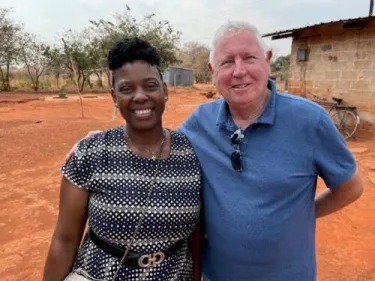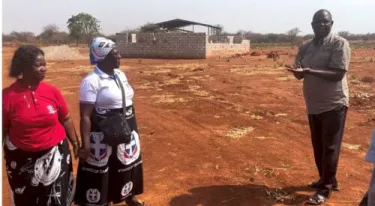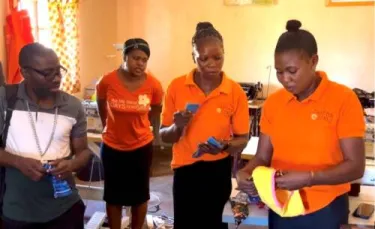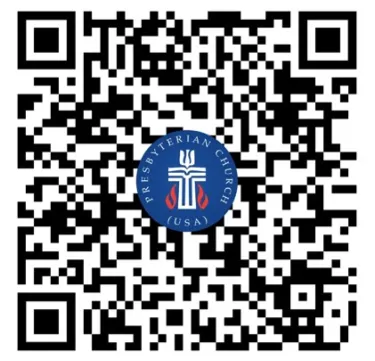Celebrating the ZZMUSA Mission Network
A Letter from Doug Tilton, mission co-worker serving in Southern Africa
Subscribe to my co-worker letters
Friends,
It is amazing what we can do when we work together as one family of Christ!
One place I have seen this recently has been in the work of the Zambia-Zimbabwe-Mozambique-USA (ZZMUSA) Mission Network. You may be familiar with mission or partnership networks, which encourage PC(USA) congregations and mid-councils with connections to or interest in particular countries or regions to work together with PC(USA) denominational staff and global partners from the area. Networks are great examples of “communities of mission practice,” deepening our relationships by enabling all participants to hear diverse perspectives, build shared understandings, agree on common values and engage in more mutual and faithful participation in God’s mission.

Initially, mission networks often focused on what PC(USA) members were doing with overseas partners. Some had a “mission fair” feel about them as members exchanged experiences and identified synergies. Increasingly, these networks are becoming platforms for doing things together. ZZMUSA is a good example. Over the years it has become more than a sum of its parts, exploring creative ways to model mutuality. In 2019, the network added “USA” to its name—a small change intended to reflect a deeper shift. No longer would the PC(USA) be an implicit “hub,” responsible for networking with partners in Southern Africa; now it was an explicit participant, sitting around the table with other denominations on an equal basis. At the same time, the network began to require that all of its structures be co-convened by members from more than one country.
Last month, I had the privilege of joining ZZMUSA members from Zambia, Zimbabwe and the USA on an “Insaka” visit to theological institutions in Zambia and Zimbabwe. The trip, which included church leaders and theological faculty members, was designed to promote connections among theological schools—a longstanding focal area for ZZMUSA (alongside health, sustainable livelihoods, and communications). The term “insaka,” familiar to many of the people groups in Zambia and Zimbabwe, refers to a forum where members of a family or community come together to discuss their common life, share ideas, learn from one another and discern responses.

The two weeks we spent together under the theme “One in Christ” were intensive and exhausting, but also exciting and inspiring. As we travelled by bus—over roads wryly labelled “massage roads”—we had many hours to get to know one another and to share more about our respective joys and challenges. As we wrestled with scripture every evening during our devotions and debriefing time, we gained new insights into how God is calling us to journey together. And as we struggled to charge devices and stay connected in the face of power cuts lasting up to 72 hours at a stretch, we gained a greater appreciation for the obstacles that pastors, church leaders, seminary students and faculty face. Even the Zimbabwean participants were amazed to discover that their neighbors in drought-ravaged and hydroelectric-dependent Zambia were experiencing longer blackouts than they do!
The trip also provided an opportunity to explain and seek feedback on a ZZMUSA initiative to connect theological students. Students at Chasefu Theological College in rural eastern Zambia, Reformed Church University in Masvingo, Zimbabwe, and Princeton Theological Seminary in New Jersey are taking part in a pilot program to facilitate direct student-to-student exchanges. All three institutions recognize the importance of cross-cultural communication skills in ministry, as well as the need to be more aware of the cultural lenses through which we all see and interpret our worlds.

ZZMUSA hopes that this pilot program will ultimately provide even more extensive opportunities for cross-cultural learning that can deepen and enrich the ministries of all partners, including the PC(USA). Insaka participant Rev. Faresy Sakala, Administrator of the Presbytery of Zimbabwe of the Uniting Presbyterian Church in Southern Africa (UPCSA), spoke movingly of how her experiences as a Zimbabwean student at Justo Mwale University in Zambia had shaped and enriched her own ministry. “I am a product of student cultural exchange,” she declared.
Although the visit was focused on theological education, there were many other “aha!” moments and opportunities for learning. We were impressed by the resourcefulness of the UPCSA Fellowship of Women in Zambia and the strategies that they had employed to build up “Camp Deborah” from a rural tract of land into a valuable resource for the Fellowship and the larger church. We were equally amazed by the diversity and extensiveness of the Church of Central Africa Presbyterian (CCAP) Synod of Zambia programs in health, education, development and evangelism. Participants from Zimbabwe were particularly interested in the CCAP’s “Days for Girls” program—which makes inexpensive reusable hygiene products and provides support to young women so that their schooling is not disrupted by the onset of menstruation—as a model that they might also explore.

ZZMUSA has also been collaborating with other African mission networks to promote better health for all. During the COVID pandemic, the conveners of the Africa mission networks began to meet regularly to support one another and PC(USA) mission personnel through prayer and encouragement and also to discern how God was calling them into deeper partnerships. The group decided to study the importance of advocacy as a form of solidarity. Rev. Jimmie Hawkins, director of the PC(USA) Advocacy Offices in Washington, D.C. and New York City, and Rev. Lydia Neshangwe, Moderator of the Uniting Presbyterian Church in Southern Africa and President of the All-Africa Conference of Churches, provided insights to spark an initial discussion. The group eventually decided to identify a particular advocacy “ask” that would have resonance for most of the networks. Together, we reflected on a long list of possibilities, culminating in the formation of a team to investigate the feasibility of promoting the new malaria vaccines that have been approved in recent months by the World Health Organization. Our first task was to consult with African partners to see if they felt that the vaccines would be accepted as an appropriate response to a disease that kills more than 600,000 people each year—95% in Africa (and mostly under the age of five).
Partners expressed overwhelming support for steps to improve access to the vaccines. As a result, the African Mission Networks worked with the PC(USA) Office of Public Witness to issue an Action Alert on the eve of World Communion Sunday (October 6) calling on members of congress to support the purchase of vaccines in low-income countries through Gavi, the global public-private vaccine alliance, as a cost-effective, efficient means to end preventable child and maternal deaths. I would encourage you to join in this effort by visiting the OPW’s action page or by scanning the accompanying QR code.
I am grateful for the opportunities to collaborate and learn from faithful members of Christ’s family in Southern Africa and across the U.S.! Thank you for your prayers and gifts that sustain my ministry and those of other PC(USA) mission co-workers like me. As we approach the seasons of Thanksgiving and Advent, I pray that you will know afresh the joy, hope and peace implicit in our Savior’s birth!
Peace,
Doug
